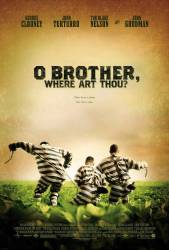Continuity mistake: In the scene near the beginning where the three main characters are running across the field to catch the train, in the shot where the train is in the foreground you clearly see the engine and the front carriage pass by the convicts while they're still quite a long way from the train. In the next shot though which is taken from behind the men with the train in the background they reach the train pretty much as soon as the engine passes them by. (00:04:45)
Revealing mistake: In the scene where the three escapees are jumping into the train, when George Clooney jumps up you can see that the chain linking him to Delmar gets longer. (00:05:10)
Factual error: The film takes place in the Thirties. The song "You are My Sunshine" is featured, but was not recorded by Jimmie Davis (its composer) until 1940. [Acknowledged by the directors]. (00:11:15)
Continuity mistake: When they first meet George Nelson, the left back seat window is half way open. A few seconds after they get into his car, Delmar gives the machine gun to Nelson through the left back seat's completely open window (the camera shows the guys all the time so we can see that Delmar didn't lower the window when he got in the car). (00:32:25 - 00:33:40)
Continuity mistake: When the trio and George Nelson arrive outside the Bank in Nelson's car it appears covered in dust. The door Pete gets out of is clean and shiny. (00:33:10)
Continuity mistake: As John Goodman is breaking the branch from the tree during the picnic scene, the branch is quite sharply pointed on both ends. In the scene immediately following, when he starts to beat the men with it, it's blunt at both ends, and a slightly different shape. (00:53:00)
Continuity mistake: In the scene where Everett finds his wife in the Woolworth's, he pulls her off to the side to have a private conversation. You can see the twine that connects her and all her children start to stretch out as she walks away. In the next shot, as she is walking over to Everett, the string is gone. (01:03:00)
Factual error: When the escapees are hiding in the movie theater, the door opens and a deputy steps in, silhouetted by the light behind him. The movie is set in the 1930's, but the shotgun the deputy is holding appears to be a 1960's model Remington pump. (01:05:40)
Continuity mistake: When Clooney and the 2 other guys enter the political meeting, there's a close shot of Clooney where he addresses Hunter. Meanwhile, the music is playing and the others are singing. Behind Clooney you can see, out of focus, a man playing a guitar along with the music. When the music stops, we go back to Clooney's close shot (where he is still talking to Hunter) but the man behind him is still playing the guitar. (01:24:10)
Audio problem: At the end of the movie when they sing "you are my sunshine" they movie into a L.S. and you can see that the words aren't synched in to their lips. (01:31:30)
Continuity mistake: There are seven Wharvey Gals. Three on the stage singing, three with the wife, and one that she's holding. One of the girls even says that there are seven of them. Yet in the end, when Everett and his wife are walking down the street, there are only six. One that she is carrying, and five following.
Factual error: When the "Little Wharvey Gals" are singing they show a shot of the crowd in which there is a man smoking a filtered cigarette. Cigarettes were not filtered until the late '40's.
Other mistake: The radio station had no power or telephone lines anywhere in the vicinity, and the lines would not have been buried in 1937. A telephone is seen on the wall inside the building, yet it couldn't have been connected to anything. There wasn't a generator to power the radio transmitter, because it would have had an exhaust pipe through the roof, nor was there any adjacent building to house a generator.
Audio problem: When Everett is hugging his three girls after they sang on the stage there is a horribly garbled part of the audio. This occurs on DVD and when it is broadcast.
Continuity mistake: In the scene where the Soggy Bottom Boys are singing "Man of Constant Sorrow" at the country radio station, the clock behind George Clooney's head shows 2:15, then 2:25, and then back to 2:10 during the course of the very short song.
Factual error: Boy says he nicked the census man but the film is set in 1937. Last census would have been 1930.
Factual error: Notice the Confederate flag in the KKK meeting at night. This takes place in the 30's and they didn't fly the Confederate flag until the 50's. Before then they flew the US flag.
Factual error: Newspaper says "July 18, 1937" but Baby face died in 1934.






Answer: I too recall that scene.
Phixius ★